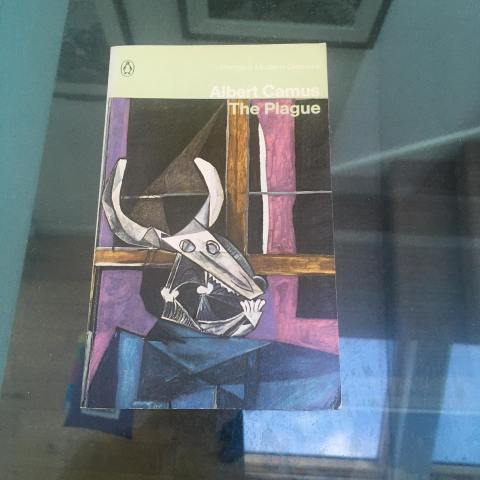The Plague
Back in the good old days of my youth Corona was fizzy drinks


In those days when I was doing A Level French and studying Albert Camus among others – in particular L’Etranger (The Outsider) which happily coincided with The Cure’s early single Killing an Arab, based on that slim book) – I read about Camus’ 1947 novel La Peste (The Plague) without actually reading the work itself, often considered Camus’ masterpiece. What I was left with was the notion that you can’t be individually happy without having collective happiness. I applied this in an old post – looking back no idea where it came from, probably from thinking about The Terminator – a notional film collaboration between James Cameron and Albert Camus!
This day last week I walked into the small bedroom where my Penguin Modern Classics reside and spotted The Plague just above my head, reached it down and began reading on the basis that there will never be a better time to read this book.
The parallels between Camus 1940s plague in Oran, Algeria and the current global pandemic of Coronavirus or Corvid90 didn’t disappoint. Camus was evidently combining an actual outbreak of a virus in that city in his native country with the realities of living under the Nazi Occupation of France during the Second World War, during which Camus had worked with the Resistance as the editor of Combat, a banned newspaper. Nonetheless the viral spread parallels were very striking so each morning I have published on social media via Instagram a resonant quote from La Peste as I read through and thought this morning that it would be worth aggregating all those posts here on Simple Pleasures Part 4. There’s nothing like a plague to refocus you on the simple pleasures of life.


“Everybody knows that pestilences have a way of recurring in the world; yet somehow we find it hard to believe in ones that crash down on our heads from a blue sky.”
“No, all those horrors were not near enough as yet even to ruffle the equanimity of that spring afternoon. The klang of an unseen tram came through the window, briskly refuting cruelty and pain. Only the sea, murmurous behind the dingy chequerboard of houses, told of the unrest, the precariousness of all things in this world.”
“This bacillus is such a queer one.”
“There,” Castel said, “I don’t agree with you. These little brutes always have an air of originality. But, at bottom, it’s always the same thing.”
“That’s your theory, anyhow. Actually, of course, we know next to nothing on the subject.”
“One of the cafés had the brilliant idea of putting up a slogan: ‘The best protection against infection is a bottle of good wine’, which confirmed an already prevalent opinion that alcohol is a safeguard against infectious disease.”
“ …though in their heart of hearts they were far from recognising the enormity of what had come on them, they couldn’t help feeling, for obvious reasons, that decidedly something had changed. Nevertheless, many continued hoping that the epidemic would soon die out and they and their families be spared. Thus they felt under no obligation to make any change in their habits, as yet. Plague was for them an unwelcome visitant, bound to take its leave one day as unexpectedly as it had come. Alarmed, but far from desperate, they hadn’t yet reached the phase when plague would seem to them the very tissue of their existence; when they forgot their lives which until now it had been given them to lead. In short, they were waiting for the turn of events.”




[…] got plenty of time on my hands! The parallels continue to resonate. So here’s picking up from my first post on the […]